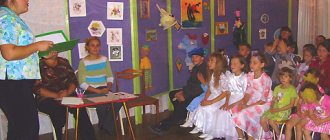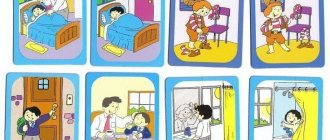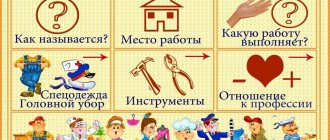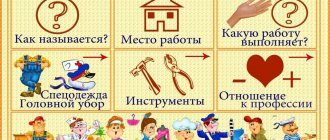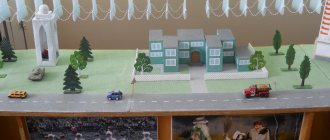Planning
In the preparatory group, the thematic week “Professions” is really important, this is due to the fact that it is at the age of 5-6 years that children begin to think about who they would like to see themselves in 15-20 years.
Professional weeks are exciting
For your information. At this stage, their life experience is quite limited, and it is difficult for them to make a choice regarding their future type of activity, therefore the most important task of educators in this area is to tell the younger generation about what professions there are.
It is also important to demonstrate to the children that each of them is important in its own way.
Target
The long-term goals and objectives of holding a week dedicated to professions in the preparatory group are:
- Expanding children's understanding of existing specialties.
- Teaching children the fact that all activities are necessary and important to society.
- Forming the ability of children to appreciate the work of representatives of various professions.
Drawing helps to better understand the topic
Lexical topic
In the preparatory group, daily lexical topics take center stage due to the fact that children will soon move to a new level of education, where they will be required to develop a significantly higher level of vocabulary.
The appropriate development of children can be carried out through viewing pictures and their subsequent analysis. It is necessary to explain to children what people in specific professions do, what benefits they bring to society, and what their life activities look like. During this topic, children will have to talk about the professions of their parents, as well as about the work of the people who work in kindergarten.
For your information . Among the examples under consideration, a special place should be occupied by the educator, teacher, doctor, engineer, etc.
Final event
As the final event of the corresponding week, it is advisable to recommend holding an exhibition of various professions. Such an exhibition will allow children to gather ideas about those professional activities that exist in the world. The corresponding event will allow, on the one hand, to expand children’s ideas about the modern world, and on the other hand, it will allow them to develop their creative skills.
Thematic planning on the theme “Women’s Day”
Mini project
As the main part of the work during the calendar week, you can imagine the mini-project “All professions are important.” The results of this project may become part of the final event. The purpose of preparing such a project may be to form children’s ideas about a specific profession and exchange information that was obtained during the work on the project.
A mini-project will help in mastering the material
Summary of OOD in the preparatory group of a preschool educational institution on the topic: Professions
Summary of OOD “There are many professions in the world, it is impossible to count them.”
Senior preschool age senior preschool age Objectives: - Expand children's understanding of the variety of professions and specific work activities.
— Form a generalized concept of “profession”, enrich the active vocabulary. — Develop attention, memory, thinking. — Foster positive motivation for learning and respect for the work of adults. Progress
Educator: Hello, guys! Today is an unusual day, I am sincerely glad to see you. I suggest you say hello. Game “Friendly Palms” We put palm to palm and offered friendship to everyone. We will play together so that we can become kind and smart. Do we offend each other - no, no, no Do we respect each other? Yes! Yes! Yes! Educator: - Children, which of you wants to grow up quickly and become an adult? Tell me, where do your moms and dads, adults, go every day? Children: adults, mothers and fathers go to work Educator: -Why do people go to work? Children: to earn money, build houses, drive cars, grow bread Educator: -What do your parents do? (ask each child) -What benefits do they bring? Children: they sew clothes, teach children, treat the sick, prepare food, transport goods. Educator: -Before we start talking about the diversity of the world of professions, I would like to play a warm-up game with you. Assignment: I will name groups of words, and you need to determine what profession we are talking about. 1.Form, rod, holster. (Policeman)
2. Ladder, hose, water.
(Firefighter)
3. Syringe, clinic, animals.
(Veterinarian)
4.Cap, stove, delicious dish.
(Cook)
5. Laws, acts, contracts.
(Lawyer)
6.Camera, navigator, movement.
(Driver)
7. Course, schedule, chassis.
(Pilot)
8. Scales, counter, goods.
(Seller)
9. Hammer, chisels, nails.
(Carpenter)
10. Machine, scissors, cut.
(Seamstress)
11. Magazine, rules, textbook.
(Teacher)
12. Carrier, block, system.
(Programmer)
13. Keel, spire, mast.
(Sailor)
14.Defense, client, court.
(Lawyer)
Well done!
Reading the poem “What do you want to become, children?” What do you children want to become? Answer us quickly! - I want to be a driver. Carry different loads. — I dream of ballet. There is no better one in the world. — I want to become a great doctor. I will treat everyone with medicine. Very tasty, like candy. I ate it - no disease! — I don’t like colors. I dream of becoming an artist. Order me a portrait. I can handle it, no doubt! - You, friends, don’t argue with me, I want to become the first in sports. Scoring the puck is a trifle for me, I play for Spartak! — I want to become a pianist. A wonderful artist. Music has been with me since childhood, I love it with all my heart. — I dream of becoming a children's teacher soon. Sing, walk, play with them. Celebrate birthdays Teacher: - What is the poem talking about? Children: the poem talks about professions. Educator: What does the word “profession” mean? Profession means:
business, work, occupation.
People work what they like to work with, do what they do best. There are many professions in the world. Name the professions that you know? Children: teacher, driver, worker, salesman, doctor, builder. 2. Statement of the problem situation. Educator: - Guys, is it hard to imagine what we will do without doctors when we get sick? - What would we wear if there were no tailors?! — What would you eat if it weren’t for the work of people who grow bread, vegetables, and fruits? - How empty and uncomfortable would our room be if it weren’t for the joiners and carpenters? 3. Discovery of something new. Game “What is he doing? » Goal: Continue to familiarize children with the actions of people in different professions. I name a profession, and you answer what a person in this profession does. Doctor - treats Teacher - teaches Doctor - treats Salesman - sells Cook - cooks Educator - educates Driver - drives a car Builder - builds All professions are needed, all professions are important. The main thing is to do your favorite job well. 4. Game “Who needs what for work?” Goal: To consolidate children’s understanding of the subjects of each profession. — People of different professions use different tools for their work. I have a “wonderful chest” that contains many interesting things. To find out what lies there, you need to say the following words: “Chest, chest, open your barrel.” Misha, look into the chest, but first say the magic words. -Who needs this item? Children: this tool is needed for an artist. Educator: - Well done, guys, you named all the subjects and professions correctly. Educator: I would like to listen to your riddles - descriptions of different professions. And to complete this task, you need to divide into groups (three people). Go to your desks. (Children sit at tables). Educator: Guys, on your tables there are pictures depicting people of different professions. You need to talk about your profession without naming it, and we have to guess what profession you told us about. And to make the story accurate and complete, you can use a plan diagram. Educator: Let's remember what the pictures in the diagram mean: 1. Hand - what a person in this profession does. 2. Geometric shapes - what objects he needs for work. 3. Heart - what qualities should a person in this profession have? Sample story: This man cuts people's hair and gives them beautiful, fashionable hairstyles. For work he needs: scissors, combs, hair dryer, curlers, perfume. He must be attentive, polite, neat. Children's independent stories. Educator: Well done, you did a good job. I really liked your stories. 5. Psycho-gymnastic exercise. Goal: To learn to depict the emotional state of people of different professions, using expressive movements and plasticity. — Each of you must choose any profession and portray it not only through action, but also through facial expressions. How do you show a driver, an artist, a musician, a hairdresser? 6. Proverbs about work. Educator: - Explain how you understand proverbs. 1. You can’t even pull a fish out of a pond without difficulty. Children: you definitely need to work hard for something to work out. 2. Labor feeds a person, but laziness spoils him. Children: if you don’t work, you will become a bad person, lazy. Educator: The main thing in a person’s life is work. Physical education In our profession we played walking in place. In an instant we became pilots! Straight arms to the sides They flew on the plane - spin around themselves And suddenly they became drivers! walking in place The steering wheel is now in our hands, our hands are in front of us, “holding the steering wheel” We are driving fast, just great! running around with the steering wheel And now at the construction site we are walking in place Laying bricks evenly. arms in front of us bent at the elbows One brick and two and three – we raise our hands up We are building a house, look! connect straight arms above your head. The game is over, it’s time for us to go to our chairs. Educator: People say: “All professions are needed - all professions are important.” But still, they can be sort of divided into groups: Professions that are always needed. What do you think these professions are? (Children's answers.) Why are they always needed? (Children's answers.) New professions. For example: MANAGER - what kind of profession is this? (Children's answers.) production management specialist. AUDITOR is a specialist who checks the financial activities of banking companies. WEB DESIGNER - (specialist in creating Internet sites). A developer is a real estate specialist who is involved in the purchase of real estate. A jobber is a specialist intermediary on the stock exchange. The main tasks are buying and selling shares. BOOKMAKER (a person who accepts money bets from players on horse racing). REALTOR – a specialist in the sale of real estate. IMAGE MAKER is a specialist in the field of advertising and technologies for creating a positive image of a candidate. MARKETOLOGIST – a person who studies and forecasts demand for goods and services, determines sales prospects in a specific environment. MERCHANDISER - a sales representative who prepares goods for sale and attracts new customers. Interesting, rare professions. Do any of you know such professions? (Children's answers.) MARKSHADER is a specialist in the construction of underground structures. A SIGNAL INTERPRETER is a person with knowledge of professional sign language who assists deaf people in many activities. Speechwriter is a specialist in writing texts for public speeches by politicians, large entrepreneurs, etc. TITTER is a tea taster. By taste, smell, appearance, this specialist can determine the type of tea, the place where it was grown, the season of collection, the method of storage and processing. But there is a very rare and at the same time one of the kindest professions that exists in Antarctica. This profession is called - PENGUIN TURNER. As you know, penguins walk very slowly and have short legs. Penguins are also very curious creatures. They always pay attention to bright objects and loud sounds. Therefore, when planes or helicopters fly noisily in the sky, penguins raise their heads high, do not look away, look at them, lose their balance and, naturally, fall on their backs. It’s uncomfortable to crawl on your back, and it’s almost impossible to roll over on the ice of Antarctica, the ice is too slippery. Therefore, at almost all Arctic stations, both ours and foreign ones, there is a specialist who is called the Penguin Turner, who walks around and puts the poor penguins on their feet. Very rare and at the same time one of the kindest professions. Educator: There are such concepts as “Profession” and “Specialty”. Do you think these are the same thing? (Children's answers.) A profession is a type of human labor activity. A specialty is a type of professional activity that requires certain knowledge and skills. For example: a teacher is a profession, a specialty is a historian. Guys, learn to distinguish between these two concepts - profession and specialty and never confuse them. In order to be able to distinguish a profession from a specialty, we will now play a game called “Profession - Specialty.” Your task:
go one by one to the table, take a card, read the word on the back and determine which concept you classify it as, and you must give an explanation for your decision.
Words for cards: Profession - teacher, salesman, accountant, doctor, mechanic. Specialty: advertising agent, therapist, geography teacher, mason, dentist. Well done! Now, you know how to distinguish between these 2 concepts - profession and specialty. Remember them. The words WANT+CAN+NEED appear on the slide. What do you think these words mean? (Children's answers.) 1. The first word is your professional interests and inclinations, dreams about the profession, i.e., what I “WANT”. 2. Second, an assessment of your professionally important qualities: abilities, health, character, temperament, etc. Or, to put it more simply, this is your “I CAN”. 3. Third - your knowledge of professions that are in demand among employers in the labor market, in other words, “MUST”. 4. As a result, we get the following formula: I WANT + CAN + NEED - this is the formula for choosing the right profession. If your dreams, i.e. what I “Want” correspond to your abilities, health or character, i.e. that I “Can”, and also that your chosen profession is in demand on the labor market, i.e. “It is necessary,” then this golden mean indicates that you have chosen this or that profession correctly. — I know that some of you have already decided on the choice of your future profession. (Children's answers.) - Why did you choose this particular profession? - Why does she attract you? -What's interesting about it? Educator: And now, let's play the game “The Most-Most.” Game “The Most” General instructions:
Now let’s play a little.
You will be offered some unusual characteristics of professions, and you must take turns naming those professions that, in your opinion, are more consistent with this characteristic. Name the professions: The sweetest (confectioner, salesperson in the confectionery department...) The most lucrative (banker, professional tennis players, boxers, model...) The greenest (gardener, forester, landscape design specialist, florist-decorator...) The most childish (educator, pediatrician , child psychologist, teacher...) The funniest (humorist, clown, parodist...) The most sociable (journalist, tour guide, coach, teacher, entertainer...) The most serious (no room for error) - (sapper, surgeon, intelligence officer, policeman, politician, psychologist...). The most toothy (dentist). The most athletic (coach, athlete). Well done! There are many professions on Earth, but choose, loving it! Decide, my friend, who you should be, Because each of them is important! Watching a cartoon about professions “All professions are needed, all professions are important.”
We recommend watching:
Summary of GCD in the middle group on the topic: Profession of a pastry chef Summary of the lesson in the middle group. Profession postman Targeted excursion to the kindergarten kitchen “What is the cook cooking for us for lunch?” Quiz game for children in the middle group of kindergarten on the topic: Professions
Similar articles:
Summary of lessons in kindergarten in the 2nd junior group. Doctor's profession
Lesson in the middle group of kindergarten. Professions of rural people
Children about the medical profession
Children about the lifeguard profession
About the profession of a museum worker for children
Long-term event planning table
During the preparation of the corresponding week, the teacher must carefully approach the issue of planning in accordance with the Federal State Educational Standard; you can draw up a note.
GCD
The following actions may be suggested as preliminary work:
- Study folk art (proverbs, sayings) touching on themes of labor and activities.
- Learn poems about work.
- Make crafts related to people's professional activities, for example, using the technique of making papier-mâché dishes.
- Compose short stories on topics related to professional activities, for example, “My work in the future”, “My parents work...”.
During the relevant lessons, students should:
- learn to guess specialists by description;
- write stories about professional competencies;
- understand the essence of the term “profession”.
For your information . Children learn best about the world through play. Therefore, it is advisable to introduce the topic to the little ones while playing riddles. This game will expand your vocabulary and stimulate creativity. The point of the game is for one child to guess a specific profession, and the others to guess it.
Lesson “Military professional activity”
A special topic of the week is the consideration of military topics in kindergarten. The purpose of this block is to form children's ideas about courage, patriotism and civic duty. It is important to develop in students respect for those people who defend their homeland.
For your information . It is important to consider the types of military specialties that exist. The teacher must provide an overview of the activities of people related to the defense of their home country. The easiest way to present relevant information is in poetic form.
What is the artistic and aesthetic development of preschool children
In addition, you can use a game in the form of cards that require the correct choice of picture to describe a specific type of activity.
In addition, an important point is the opportunity to update children’s knowledge. They need to explain the history of military activity, the essence of the craft itself. You can also talk about the successes of representatives of Russian military personnel in past and present years, and what is planned.
Kids love military themes
